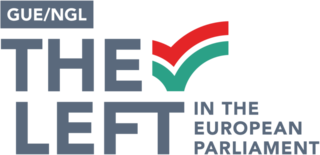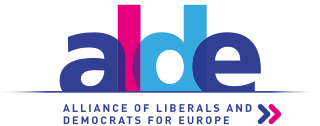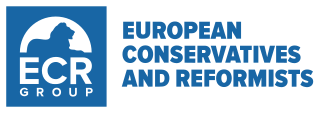
The European Free Alliance (EFA) is a European political party that consists of various regionalist, separatist and ethnic minority political parties in Europe. Member parties advocate either for full political independence and sovereignty, or some form of devolution or self-governance for their country or region. The alliance has generally limited its membership to centre-left and left-wing parties; therefore, only a fraction of European regionalist parties are members of the EFA.

The Left in the European Parliament – GUE/NGL is a left-wing political group of the European Parliament established in 1995. Before January 2021, it was named the European United Left/Nordic Green Left.
The European Democrats were a loose association of conservative political parties in Europe. It was a political group in the European Parliament from 1979 until 1992, when it became a subgroup of the European People's Party–European Democrats (EPP-ED) group. The European Democrats continued to exist as a political group in the Parliamentary Assembly of the Council of Europe (PACE) until 2014, when it became the European Conservatives Group.

Union for Europe of the Nations (UEN) was a national–conservative, Eurosceptic political group of the European Parliament active between 1999 and 2009.

The Hungarian Democratic Forum was a centre-right political party in Hungary. It had a Hungarian nationalist, national-conservative, Christian-democratic ideology. The party was represented continuously in the National Assembly from the restoration of democracy in 1990 until 2010. It was dissolved on 8 April 2011.

The political groups of the European Parliament are the officially recognised political groups consisting of legislators of aligned ideologies in the European Parliament.

For Fatherland and Freedom/LNNK was a free-market, national conservative political party in Latvia. In 2011, it dissolved and merged into the National Alliance.

Roberts Zīle is a Latvian economist and politician and Vice President of the European Parliament for the National Alliance, a free market national conservative political party in Latvia. In the seventh term of the European Parliament, he works in the European Conservatives and Reformists group; he is a member of European Conservatives and Reformists Group Executive and a member of the group Bureau. He was formerly vice-president of the now defunct Union for a Europe of Nations group.

Jan Zahradil is a Czech politician for the Civic Democratic Party (ODS) who has been Member of the European Parliament (MEP) since the Czech Republic entered the European Union in 2004. Zahradil also served as Member of the Chamber of Deputies (MP) from 1998 to 2004.

Europeans United for Democracy – Alliance for a Europe of Democracies, formerly known as EUDemocrats, was a Eurosceptic and self-described Eurorealist alliance of parties and movements from 15 European countries. It operated as a transnational party at the European level, according to Regulation (EC) No 2004/2003. It incorporated members from both the left and right of the political spectrum.

The Movement for European Reform, abbreviated to MER, was a pan-European alliance of national centre-right political parties with conservative, pro-free market and Eurosceptic inclinations. It consisted of the Conservative Party of the United Kingdom and the Civic Democratic Party of the Czech Republic.

The 2009 European Parliament election was held in the 27 member states of the European Union (EU) between 4 and 7 June 2009. A total of 736 Members of the European Parliament (MEPs) were elected to represent some 500 million Europeans, making these the biggest trans-national elections in history. An additional 18 observers were pre-elected.

The European Alliance (EA) is a political group in the European Committee of the Regions composed of a mix of regionalist parties and independent members. It was established in 1996, with strong influence of the European Free Alliance, and has since then existed in several incarnations.

The Group of the Alliance of Liberals and Democrats for Europe was the liberal–centrist political group of the European Parliament from 2004 until 2019. It was made up of MEPs from two European political parties, the Alliance of Liberals and Democrats for Europe Party and the European Democratic Party, which collectively form the Alliance of Liberals and Democrats for Europe.

This article describes the party affiliations of leaders of each member-state represented in the European Council during the year 2009. The list below gives the political party that each head of government, or head of state, belongs to at the national level, as well as the European political alliance to which that national party belongs. The states are listed from most to least populous. More populous states have greater influence in the council, in accordance with the system of Qualified Majority Voting.

Europe of Freedom and Democracy (EFD) was a Eurosceptic political group in the European Parliament. The group was formed following the 2009 European parliamentary election, mostly composed of elements of the Independence/Democracy (IND/DEM) and Union for a Europe of Nations (UEN) groups that had existed during the 6th European Parliament. The group had a loose relationship with Movement for a Europe of Liberties and Democracy (MELD), a European political party founded in 2011.

The European Conservatives and Reformists (ECR) is a soft Eurosceptic, anti-federalist political group of the European Parliament. The ECR is the parliamentary group of the European Conservatives and Reformists Party European political party (formerly known as the Alliance of Conservatives and Reformists in Europe or Alliance of European Conservatives and Reformists, but also includes MEPs from four other European parties and thirteen MEPs without European party affiliation.

The European Conservatives and Reformists Party, formerly known as Alliance of European Conservatives and Reformists (AECR) (2009–2016) and Alliance of Conservatives and Reformists in Europe (ACRE) (2016–2019), is a conservative, soft Eurosceptic European political party with a main focus on reforming the European Union (EU) on the basis of Eurorealism, as opposed to total rejection of the EU (anti-EU-ism).

New Direction – The Foundation for European Reform is a political foundation at European level, think tank and publisher affiliated with the European Conservatives and Reformists Party (ECR). It was established in 2010, under the patronage of Baroness Thatcher. It is based in Brussels with satellite offices in London and Warsaw. New Direction is a free-market think tank that promotes European reform through the strengthening of accountability, transparency and democracy.
The Movement for a Europe of Liberties and Democracy, abbreviated to MELD, was a national-conservative political party at European level founded in 2011, composed of parties belonging to the Europe of Freedom and Democracy (EFD) group in the European Parliament, with the notable absence of the UK Independence Party, which was a member of the EFD, but not of the MELD. In 2012, MELD received a grant from the European Parliament of €621,482. Its affiliated political foundation was the Foundation for a Europe of Liberties and Democracy (FELD), which received a grant of €412,361. Both were headquartered at 18, rue Cler, in Paris, France. The president of the party was Jacek Wlosowicz.
















